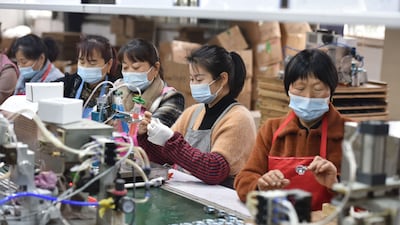China’s economy is paying the price for the government’s Covid Zero policy with industrial output and consumer spending sliding to the worst levels since the pandemic began and analysts warning of no quick recovery.
Industrial output unexpectedly fell 2.9 per cent in April from a year ago, while retail sales contracted 11.1 per cent in the period, weaker than a projected 6.6 per cent drop. The unemployment rate climbed to 6.1 per cent and the youth jobless rate hit a record.
China’s economy has taken an enormous hit from the government’s stringent efforts to keep the virus at bay, with major cities like Shanghai locked down for several weeks and restrictions in many other places cutting into spending, shutting factories and blocking supply chains.
The government is insisting on sticking with its Covid Zero strategy to curb infections, even though the high transmissibility of the omicron variant puts cities at greater risk of repeatedly locking down and reopening. Shanghai is slowly starting to reopen, but it’s likely to take a long time for businesses to return to normal operation.
Zhang Zhiwei, chief economist at Pinpoint Asset Management, said it’s possible the economy could contract in the second quarter, putting the government’s ambitious full-year growth target of around 5.5 per cent further out of reach.
While the “government faces mounting pressure to launch new stimulus to stabilize the economy” the effectiveness of any new policies depends on how Beijing adjusts its zero-tolerance policy against the omicron crisis, he said.
China’s benchmark CSI 300 stock was down 0.7 per cent as of 11.19am local time. The onshore yuan was little changed at 6.7895 per dollar, while the yield on 10-year government bonds rose 1 basis point at 2.83 per cent. Healthcare and consumer staples stocks were the worst performers in the CSI 300 Index, while energy-related shares were the best performers.
“China’s April activity data laid bare the damage from Covid lockdowns in Shanghai and other parts of the country. The impact was much wider and deeper than expected,” according to Chang Shu and Eric Zhu of Bloomberg Economics.
“The data point to a deeper slowdown this year than expected.”
Beijing has signalled that policymakers will step up support for the economy, with Premier Li Keqiang recently urging officials to ensure stability through fiscal and monetary policy.
The People’s Bank of China took steps on Sunday to ease a housing crunch by reducing mortgage rates for first-time homebuyers. However, it left the interest rate on one-year policy loans unchanged on Monday, as inflation pressure and worries about capital outflows reduce the scope for more easing.
“It is clear that the impact of lockdowns, or the fear of lockdowns, overwhelmed any economic easing, and the Shanghai lockdown had ripple effects across the nation,” said Wei Yao, head of research for Asia Pacific and chief economist at Societe Generale. The jump in the jobless rate will be of particular worry to China’s leadership, Ms Wei said.
“If this set does not raise the urgency of adjusting the zero-Covid measures to allow the economy to normalise, we don’t know what will,” she said.
The National Bureau of Statistics said the Covid outbreaks had a “big impact” on the economy in April, but the effects are likely to be short-lived. “With progress in Covid controls and policies to stabilize the economy taking effect, the economy is likely to recover gradually,” it said, adding that it doesn’t expect GDP to contract in the second quarter.
Fixed-asset investment increased 6.8% in the first four months of the year, likely supported by the government’s push to expand infrastructure spending. However, cement output was down 18.9% in April and production of crude steel and steel products both dropped more than 5%. The production of cars plunged 44% and total manufacturing output dropped 4.6 per cent.
The authorities put a bullish spin on the numbers, with the official statement saying the “general trend of high-quality development remained unchanged despite the increased downward pressure.”
Monetary stimulus is proving less effective in the face of Covid lockdowns, with data on Friday showing businesses and consumers had little appetite to borrow in April. Credit growth weakened sharply last month, with new yuan loans sinking to the lowest level since December 2017.
Banks could cut their main lending rates on Friday this week, which would help to further lower mortgage rates for homebuyers after the cut announced by the PBOC over the weekend. However, economists see the impact as fairly limited for now.
China’s housing market is a crucial source of growth for the domestic economy but has been in a slump for almost a year, with sales dropping at a double-digit pace every month since August 2021 and prices of new homes also falling after a government crackdown on indebted property developers.
Investment in property development fell 2.7% in the first four months of the year, while the value of homes sales dropped 32%, the data showed.
“The biggest problem that we currently see is the continued current pressure on credit, and to the extent that the business confidence is being shaken, and therefore credit demand is now fundamentally being damaged,” Helen Qiao, economist for Greater China at Bank of America, said in an interview on Bloomberg TV.
“And therefore it takes more than just a simple interest rate cut to boost the credit demand.

